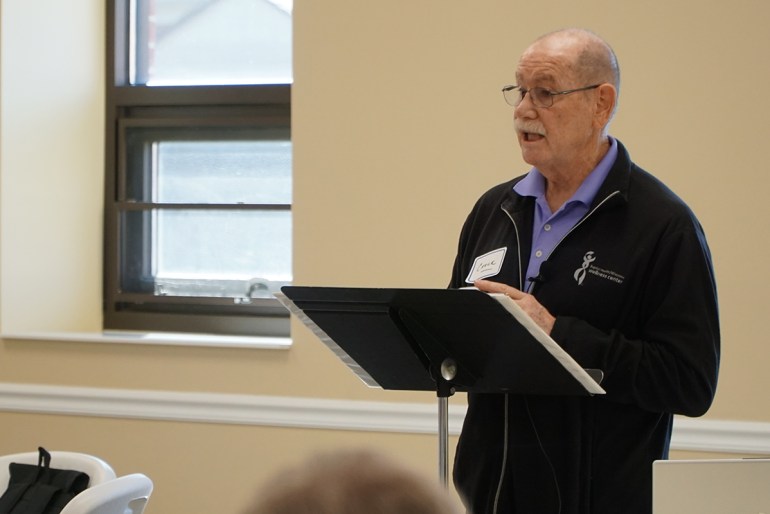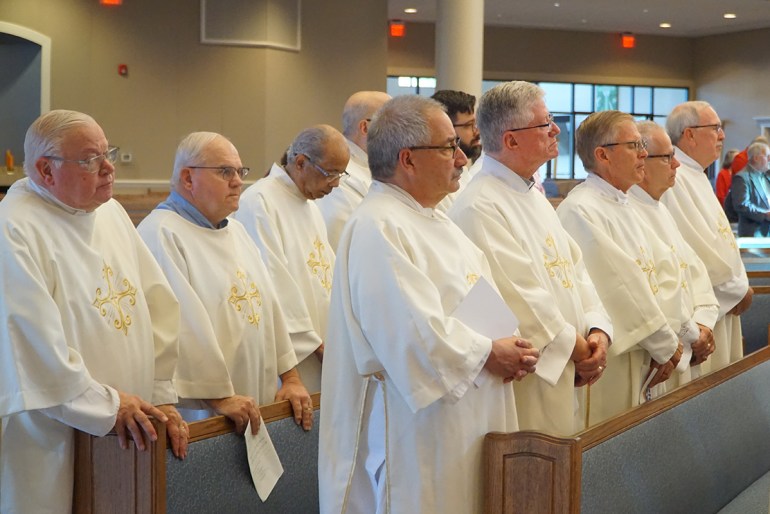
Seventy-one deacons and their wives gathered for the annual deacon assembly Sept. 27 at St. Peter the Apostle Church, 5431 Johnsontown Road.
The assembly began with Mass, in which the Rite of Admission to Candidacy for Holy Orders was celebrated by 13 aspirants from 11 parishes in the archdiocese.
At the Mass, which drew more than 300 participants, the aspirants stated their intention to continue formation for the permanent diaconate, and Archbishop Shelton J. Fabre accepted the men as candidates.
“Ordination to the permanent diaconate, as well as to the priesthood and the episcopacy, is not something any of us deserves. It is not something any of us can claim a right to receive. Holy orders is a gift from God. It is recognized and conferred by the Church. And it is accepted by the men who are called.”
— Archbishop Shelton J. Fabre
During his homily, Archbishop Fabre reminded the aspirants that the call to the permanent diaconate is a gift, not a right.
“Ordination to the permanent diaconate, as well as to the priesthood and the episcopacy, is not something any of us deserves. It is not something any of us can claim a right to receive. Holy orders is a gift from God. It is recognized and conferred by the Church. And it is accepted by the men who are called,” he said.
The gift of holy orders is to be “humbly received,” and humility ought to be a “key virtue” in every cleric, he told them.
As the candidates continue to discern and prepare for ordination as permanent deacons, he encouraged them to “constantly acknowledge your own need for God, your own unworthiness regarding ordination.”

After the liturgy, the deacons and their wives continued to share the day in fellowship and formation, beginning with a presentation on physical wellness by Deacon Charles “Chuck” Bent, who serves at St. Margaret Mary Church.
Deacon Bent, who is a nutritional counselor at Baptist Health’s Milestone Wellness Center, shared his personal experience of weight loss with the group.
When he was growing up in the 1950s and ‘60s, fast food, drive-throughs and food delivery had not been invented, he told the group. The only food delivery was the milk from the milkman, he said with a laugh.
Now, we live in a time when you can get Dairy Queen delivered to your door for your “afternoon Dairy Queen blizzard fix,” he said.

With these changes have come an increase in obesity, diabetes, high blood pressure and high cholesterol, Deacon Bent said.
When he began his formation for ministry, he was struggling with weight management, had a long list of health problems and his quality of life was decreasing rapidly, Deacon Bent told them.
“I knew that if I was called to serve, I needed to be healthy. I couldn’t be a walking heart attack, which I felt I was,” he said. “I knew that I had to do something soon, or all of the effort of becoming a deacon would be completely pointless, as I would be useless or dead.”
Something inside of him “snapped” on Oct. 18, 2007, he said. That day, he couldn’t walk up the 13 steps of his home to his office upstairs. Later that day, he tried to walk a mile and failed, he said.

That’s when he set up an appointment to address his weight and health concerns, he said. That year, he lost 80 pounds and “got my life back,” he said.
Using his story of weight loss, Deacon Bent encouraged the deacons to prioritize clean eating and exercise and shared some tips for healthy eating and an active lifestyle.
Physical wellness is intimately connected with serving as an “effective deacon,” he told them.
“How can we be effective ministers when we’re too busy nursing our own injuries?” he asked them. “We can’t.”
Deacon John Strain, who serves at the Church of the Annunciation in Shelbyville, Ky., and St. John Chrysostom in Eminence, Ky., said the presentation was a “humble reminder” that clergy must be intentional about their physical wellness.

“It’s a really good reminder that we are responsible not only for being a steward to others, but also being a steward to ourselves. And it was a very humble reminder that we are responsible for our health so that we can continue to serve our communities,” he said.
The annual gathering is important for maintaining a “sense of community” among the deacons of the archdiocese, said Deacon Strain.
“Having a day dedicated to gather together as a deacon community strengthens not only our bond as a community, but our fire to serve others,” he said.
Presentations about pastoral planning and the state of the diaconate ministry in the archdiocese were given later that day. The assembly concluded with a dinner honoring deacons celebrating significant jubilees.

Thank you for this posting. I look forward each week to reading it. My snail mail never delivers it to us until the following week.
the article on the annual gathering of the Deacons was really apprfeciated by me. My Hubby and I have always supported our Deacons. Currently we have Deacon Kevin Webb and Mrs. Donrita Webb. They are great additions to our
Parish of St. Benedict.
Wow!! Very cool
Thanks
CB